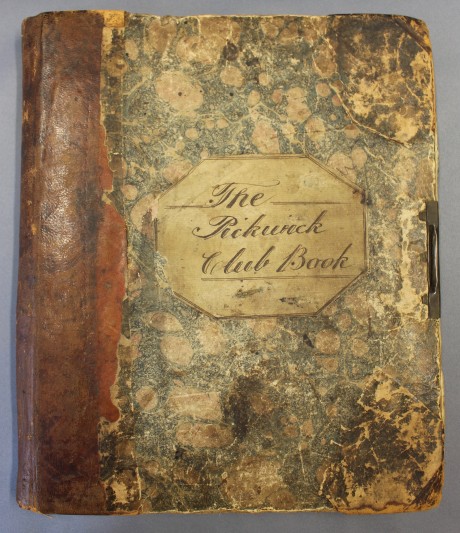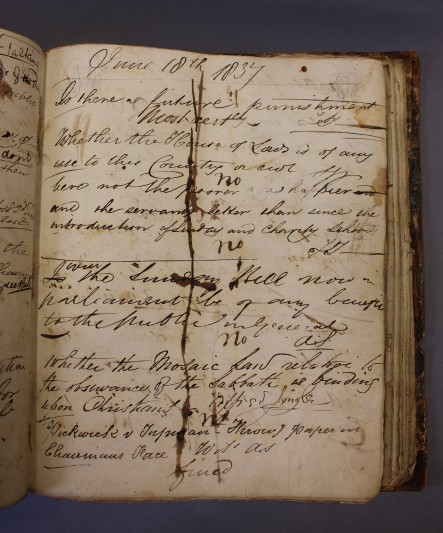On 15 June 2016, with support from the Friends of the National Libraries and the Arts Council England/V&A Purchase Grant Fund, the Charles Dickens Museum successfully bid at Bonham’s for the Pickwick Club Minute Book, 1837-1843. This is a hard-backed, handwritten notebook, filled in by a group of men who gathered regularly in a London pub to debate local, national and international current events, trade in banter and discuss literature and cultural matters. Modelling themselves on the club described in Charles Dickens’s The Pickwick Papers, published in monthly parts from March 1836 to November 1837, the members adopted the names of the club’s fictional characters and embodied similar characteristics of the original Pickwickians, celebrating the convivial and humorous spirit of the club and characters.
The Pickwick Minute Book is a pertinent and desirable acquisition for the Museum, complementing existing material in our collection. The cultural history of Dickens clubs, the consumption of the novelist’s works, the significance of Dickensian characters beyond the novels, and the greater story of early Victorian London are all themes represented in a profound way within this fascinating book, which ran concurrently with the publication of the monthly parts for nearly a year. It is by far the earliest record of a Dickens club and enhances other items in the Museum’s collection relating to Dickensian interest groups, for example, the Pickwick Bicycle Club (est. 1870), the Dickens Fellowship (est. 1902), the Boz Club (est. 1900) and the Uncommercial Travellers’ Club (est. 1920s).
Dickens always took an interest in the way his readers made use of his stories and particularly delighted in these groups. In 1837, he wrote to the newly-formed Edinburgh Pickwick Club, exclaiming, ‘I cannot tell you how much delight it has afforded me to hear of its existence… Mr Pickwick’s heart is among you always’ (this letter is also in the Museum’s collection).
We are extremely grateful to the Friends of the National Libraries for responding so quickly to our urgent appeal to secure this truly unique and irreplaceable document. We were nearly outbid by an overseas agent at a lively auction.
We are confident that this extraordinary minute book will be of great interest to scholars from around the world and anticipate that it will also be of use to more general London historians seeking to recall the city and its inhabitants. The Museum plans to use the book as part of the programme for the new MA in Dickens Studies being delivered in partnership with the University of Buckingham (commencing 2017). It will be exhibited in Dickens’s study at 48 Doughty Street, the room in which he finished writing The Pickwick Papers. We are also investigating a possible Post Doctoral Research project based around it.

